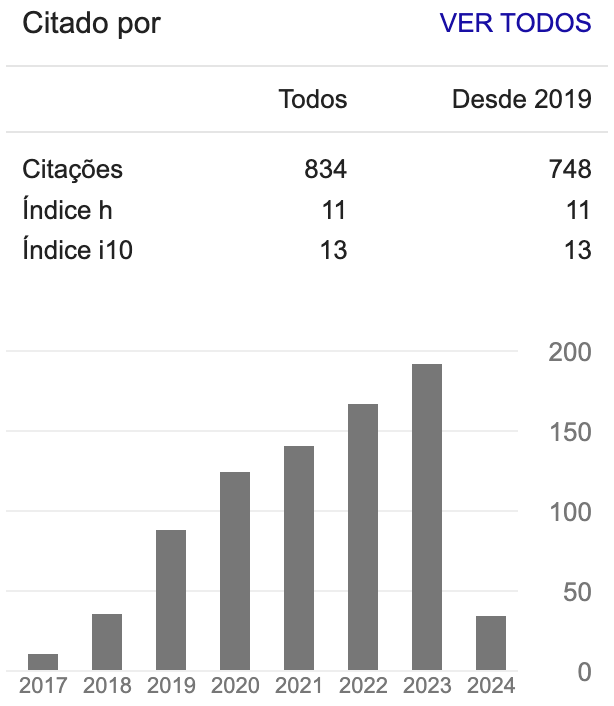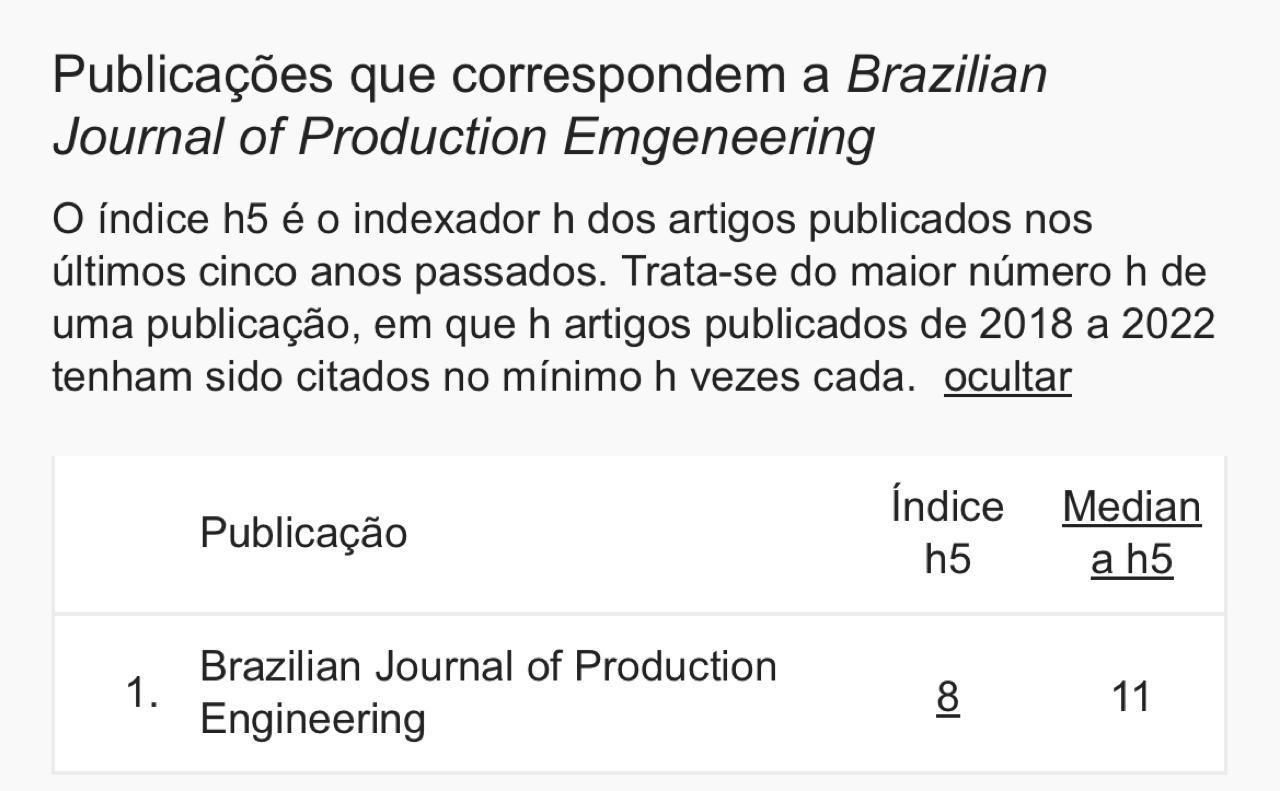Mathematical model for postponing time in reverse logistics network design with capacity levels
DOI:
https://doi.org/10.47456/bjpe.v6i7.32475Keywords:
Time Postponement, Reverse logistic, Supply Chain Design, Mathematical Modeling, Used Cooking OilAbstract
A crucial issue in the design of efficient logistics systems is the locations for inventory. In parallel to this, the worldwide growth in the consumption of products causes the emergence of a concern about the end of the useful life or the end of the consumption of these products since their inappropriate disposal can cause serious environmental problems. The disposal of used cooking oil is one of these situations, which when improperly disposed of can have a severe environmental impact in a region. In this paper, the time postponement problem is analyzed and was proposed a mathematical modeling for the use of time postponement in the reverse supply chain design, with validation of its use with the application in the reverse logistics system of cooking oil in Vitória from scenarios to evaluate the technique and then solve efficiently e with an optimal solution the problem with the implementation in CPLEX 12.6.
Downloads
References
Alderson, W. (1950) Marketing efficiency and the principle of postponement. Cost and Profit Outlook.
Aviv, Y., & A. Federgruen (2001). Design for postponement: A comprehensive characterization of its benefits under unknown demand distributions. Operations Research, 49(4), 578-598.
Brasil (2010). Lei nº 12.305, de 02 de agosto de 2010. Institui a Política Nacional de Resíduos Sólidos; altera a Lei no 9.605, de 12 de fevereiro de 1998; e dá outras providências. Diário Oficial da União, Brasília, 03 ago. 2010. Disponível em: <http://www.planalto.gov.br/ccivil_03/_ato2007-2010/2010/lei/l12305.htm>. Acesso em: 29 jul. 2020.
Brasil (2014). Óleo de cozinha pode ser descartado de forma consciente. Portal Brasil. 2014. Disponível em: <http://www.brasil.gov.br/meio-ambiente/2014/08/oleo-de-cozinha-pode-ser-descartado-de-forma-consciente>. Acesso em: 7 fev. 2017
Bucklin, L. P. (1965). Postponement, speculation and the structure of distribution channels. Journal of marketing research, 2(1), 26-31.
Çelebi, D. (2015). Inventory control in a centralized distribution network using genetic algorithms: A case study. Computers & Industrial Engineering, 87, 532-539.
Das, C., & R. Tyagi (1997). Role of inventory and transportation costs in determining the optimal degree of centralization. Transportation Research Part E: Logistics and Transportation Review, 33(3), 171-179.
De Brito, M. P., & Dekker, R. (2004). A framework for reverse logistics. In Reverse logistics (pp. 3-27). Springer, Berlin, Heidelberg.
Dekker, R., et al., (Eds.). (2013). Reverse logistics: quantitative models for closed-loop supply chains. Springer Science & Business Media.
Ferri, G. L., Chaves, G. L. D., & Ribeiro, G. M. (2015) Análise e localização de centros de armazenamento e triagem de resíduos sólidos urbanos para a rede de logística reversa: um estudo de caso no município de São Mateus, ES. Revista Produção, 25(1), 27-42.
Eynan, A. (1999). The multi-location inventory centralization problem with first-come, first-served allocation. European Journal of Operational Research, 114(1), 38-49.
García‐Dastugue, S. J., & Lambert, D. M. (2007). Interorganizational time‐based postponement in the supply chain. Journal of Business Logistics, 28(1), 57-81.
Gaur, S., & Ravindran, A. R. (2006). A bi-criteria model for the inventory aggregation problem under risk pooling. Computers & industrial engineering, 51(3), 482-501.
Gonçalves, M. F. S. (2015) Planejamento da logística reversa do óleo residual de fritura para uma destinação ambientalmente correta. 112p. Dissertação (Mestrado em Engenharia de Produção) - Departamento de Engenharia e Tecnologia da Universidade Federal do Espírito Santo, São Mateus.
Graves, S. C., & S. P. Willems, (2000). Optimizing strategic safety stock placement in supply chains. Manufacturing & Service Operations Management, 2(1), 68-83.
IBGE (2010). Cidades. Disponível em: <http://www.cidades.ibge.gov.br/xtras/perfil.php?lang=&codmun=320530>. Acesso em: 29 jul. 2020.
IBM (2012). IBM ILOG CPLEX v12.6: User’s manual for CPLEX.
Jabali, O. et al. (2012). Analysis of travel times and CO2 emissions in time‐dependent vehicle routing. Production and Operations Management, 21(6), 1060-1074.
Kutanoglu, E., & D. Lohiya (2008). Integrated inventory and transportation mode selection: A service parts logistics system. Transportation Research Part E: Logistics and Transportation Review, 44(5), 665-683.
Lau, H. S., & A. H. L. Lau (1996). The newsstand problem: A capacitated multiple-product single-period inventory problem. European Journal of Operational Research, 94(1), 29-42.
Leite, P. R. (2002). Logística reversa: nova área da logística empresarial. Revista Tecnologística.
Leite, P. (2009). Logística Reversa: Meio Ambiente e Competitividade, 2003. São Paulo: Editora Ciência Moderna Ltda.
Madalozo, J. A. (2008) O potencial de uso do rejeito de óleo vegetal para produção de biodiesel em Ponta Grossa – PR. 98p. Dissertação (Mestrado em Gestão Territorial) – Setor de Ciências Exatas e Naturais da Universidade Estadual do Paraná, Ponta Grossa, 2008.
Meade, L., et al., (2007). The theory and practice of reverse logistics. International Journal of Logistics Systems and Management, 3(1), 56-84.
Melo, M. T., et al., (2009). Facility location and supply chain management–A review. European journal of operational research, 196(2), 401-412.
Nozick, L. K., & Turnquist, M. A. (2001). Inventory, transportation, service quality and the location of distribution centers. European Journal of Operational Research, 129(2), 362-371.
Pires, S. (2004). Gestão da cadeia de suprimentos: conceitos, estratégias, práticas e casos. 2ª edição. São Paulo: Editora Atlas.
Pitta Junior, O. et al. (2009). Reciclagem do óleo de cozinha usado: uma contribuição para aumentar a produtividade do processo. In Internacional Workshop Advances In Cleaner Production (Vol. 2, pp. 1-10).
Porto, M. M. (2007). Portos e o Desenvolvimento. Aduaneiras.
Razmi, J., Zahedi-Anaraki, A., & Zakerinia, M. (2013). A bi-objective stochastic optimization model for reliable warehouse network redesign. Mathematical and Computer Modelling, 58(11-12), 1804-1813.
Servare Junior, M. W. J., & P. A. Cardoso (2016). Time postponement in supply chain: a mathematical programming review. Anais do 23rd European Operations Management Association Conference, EUROMA, Trondheim.
Servare Junior, M. W. J., et al., (2018). Mathematical model for supply chain design with time postponement. Transportes, 26(4), 1-15.
Vitória (2011). Censo Demográfico da Prefeitura Municipal de Vitória. Disponível em: <http://legado.vitoria.es.gov.br/regionais/Censo_2010/Tab3_sinopse_pop.asp>. Acesso em 5 fev. 2017
Vitória (2014a). Projeto de Lei n º 308, de 13 de outubro de 2014. Estabelece a obrigatoriedade aos estabelecimentos comercializadores de óleo de cozinha, especificamente mercados e supermercados, acima de 50 metros quadrados de área destinada ao consumidor, a manter em local visível e de fácil acesso, recipiente especial para o seu descarte. Câmara Municipal de Vitória, ES, 13 out. 2014a. Disponível em: <http://www.cmv.es.gov.br/Arquivo/Documents/PL/PL3082014.pdf>. Acesso em 9 jan. 2017.
Vitória (2014b). Lei n º 8.611, de 2 de janeiro de 2014. Altera o artigo 2º da Lei nº6.077, de 30 de dezembro de 2003. Câmara Municipal de Vitória, ES. Disponível em: <http://sistemas.vitoria.es.gov.br/webleis/Arquivos/2013/L8611.PDF>. Acesso em: 29 jul. 2020.
Downloads
Published
How to Cite
Issue
Section
License
Copyright (c) 2020 Brazilian Journal of Production Engineering - BJPE

This work is licensed under a Creative Commons Attribution-NonCommercial-ShareAlike 4.0 International License.
Atribuição-NãoComercial-CompartilhaIgual
CC BY-NC-SA
This license lets others remix, adapt, and build upon your work non-commercially, as long as they credit you and license their new creations under the identical terms.





































































